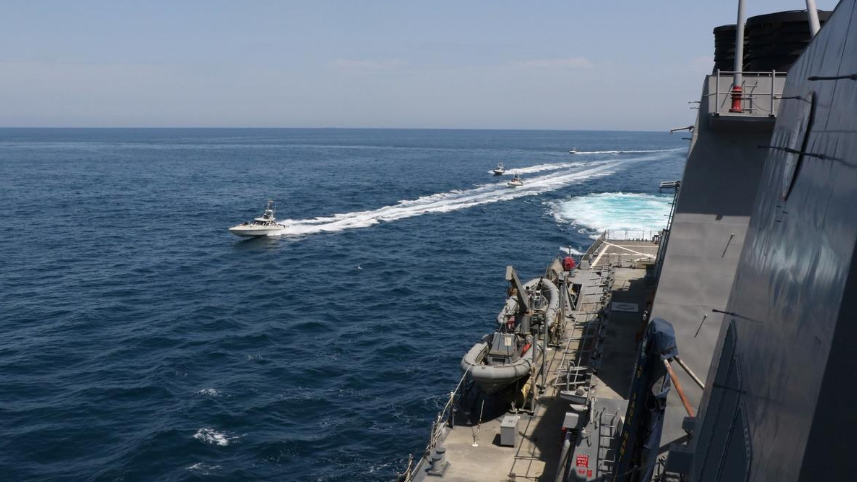
By Wang Jin
The confrontation between the US and Iran hasn’t been mitigated amid the global fight against the COVID-19 pandemic.
On April 15, eleven vessels from the Iran’s Islamic Revolutionary Guard Corps (IRGC) approached the US Coast Guard (USCG) vessels in the Persian Gulf, reportedly within just ten meters away from US patrol vessel Maui’s bow. The US Secretary of Defense Mark Esper said the US military will stay on alert and be fully prepared to counter any threat and rival. Denying the accusations, Iran said its maritime forces were just having a routine training when encountering unprofessional and provocative maneuvers from American vessels.
US media reported that Iran also successfully launched a military satellite on April 22, which the US Secretary of State Pompeo said was a blatant breach of the UN Security Council’s resolution, adding that Iran should be responsible for what it did. President Trump tweeted that he had instructed the US Navy to "shoot down and destroy any and all Iranian gunboats if they harass our ships at sea". Gen. John Hyten, Vice Chairman of the Joint Chiefs of Staff, said “I like that the president warned an adversary. We know what that line is and we will respond.”
There have been constant frictions between Washington and Tehran and the following dynamics are worth our close attention.
First, confrontation in the field of military security won’t be mitigated amidst the COVID-19 pandemic. As the world is being afflicted by the novel coronavirus, the military conflicts once again remind us that military security issues have never left but remain the fundamental factors of the international landscape. Truce for the sake of fighting the virus is just wishful thinking by the pacifists, whereas the conflicting parties are more focused on how to expand their influence during the pandemic.
Second, the US-Iran friction has become normal. The relationship between Washington and Tehran plummeted after a series of frictions in 2019. The US Department of State designated IRGC as a “foreign terrorist organization”, the US Secretary of State Pompeo announced a suspension of licenses to the countries importing Iranian petroleum, and the White House has repeatedly accused Iran of attacking oil tankers in the Gulf and Saudi Arabia’s oil production facilities. Iran, in response, has shot down American unmanned aerial vehicles (UAV). Kata’ib Hezbollah (KH), a pro-Iran militia group in Iraq, fired more than 30 rocket projectiles to an American base at the end of last year, killing one American soldier and wounding another four. In response, the US military killed tens of Iraqis during an airstrike of KH, prompting the Iraqi people to besiege and assault the US embassy. Iran also went beyond the Iranian nuclear agreement in May, July, September, and November. In early 2020, Maj. Gen. Qassim Suleimani, commander of IRGC’s Quds Force, was killed during a drone attack authorized by Trump, after which Iran announced to halt its fulfillment of the Iranian nuclear agreement and launched missiles to the American base in Iraq. Later Trump gave a speech that cooled down the escalated mutual retaliation between the two sides and get a temporary grip on their tension.
Both the US and Iran achieved their goals during the several rounds of confrontations in 2019 and early 2020. On Iran’s side, the country held the bottom line of “equivalent revenge” but its “revenge” hasn’t ended. On the American side, its voters hoped to maintain a tough stance on Iran but didn’t want a war with it. Although Washington and Tehran averted a military conflict for the time being, their confrontation and skirmishes will last a long time given the shattered mutual trust.
Third, considering the current situation, neither the US nor Iran intends to engage in a large-scale war. Still feeling the “repercussions” from the Iraqi war and the Afghan war, the Trump administration hopes to withdraw from the Middle East. At present, to win the 2020 re-election through fighting the COVID-19 pandemic and recovering the economy has been listed as its top priorities this year. Therefore, Trump has no intention of waging a war against Iran, while Iran , in order to maintain its regime, won’t easily start a war either due to its inferior strength.
Every time there is a crisis with Iran, the US responds by increasing troops on a large scale, which, however, is only aimed at deterrence and defense as it has to make a gesture anyway without engaging in a war. The pandemic has taken a heavy toll on the US military, with a sharply rising number of infections and clustered cases on several aircraft carriers. The prolonged frictions between the US and Iran are actually a severe test on the US military’s war preparedness. The US Secretary of Defense Esper previously said he hoped to recall troops from the Middle East and other regions so that they can concentrate on addressing the challenges from China and Russia, but his wish may hardly come true given Washington’s lasting antagonism with Tehran.
(The author is an associate researcher at the Institute of American Studies, China Institutes of Contemporary International Relations)













